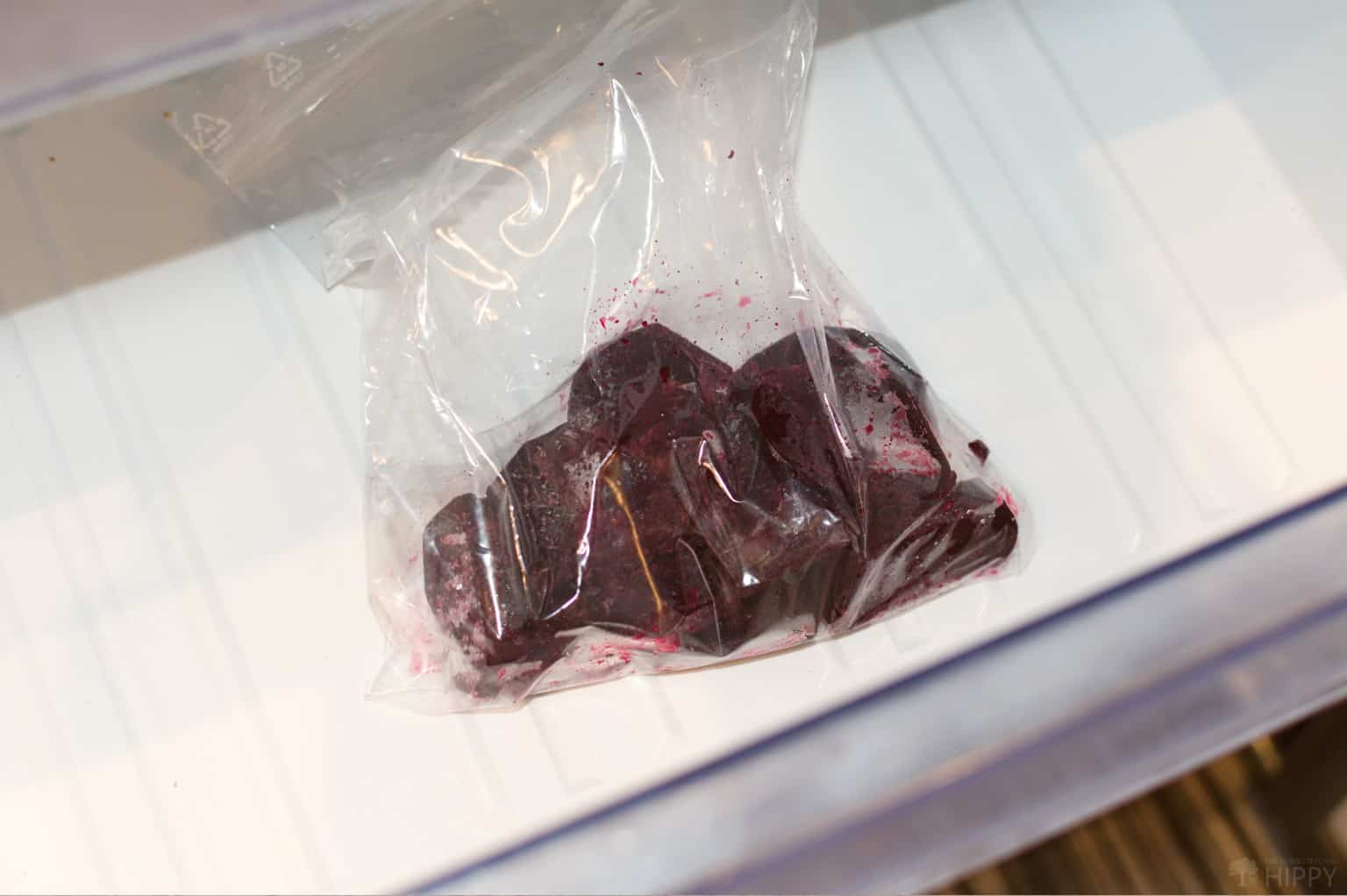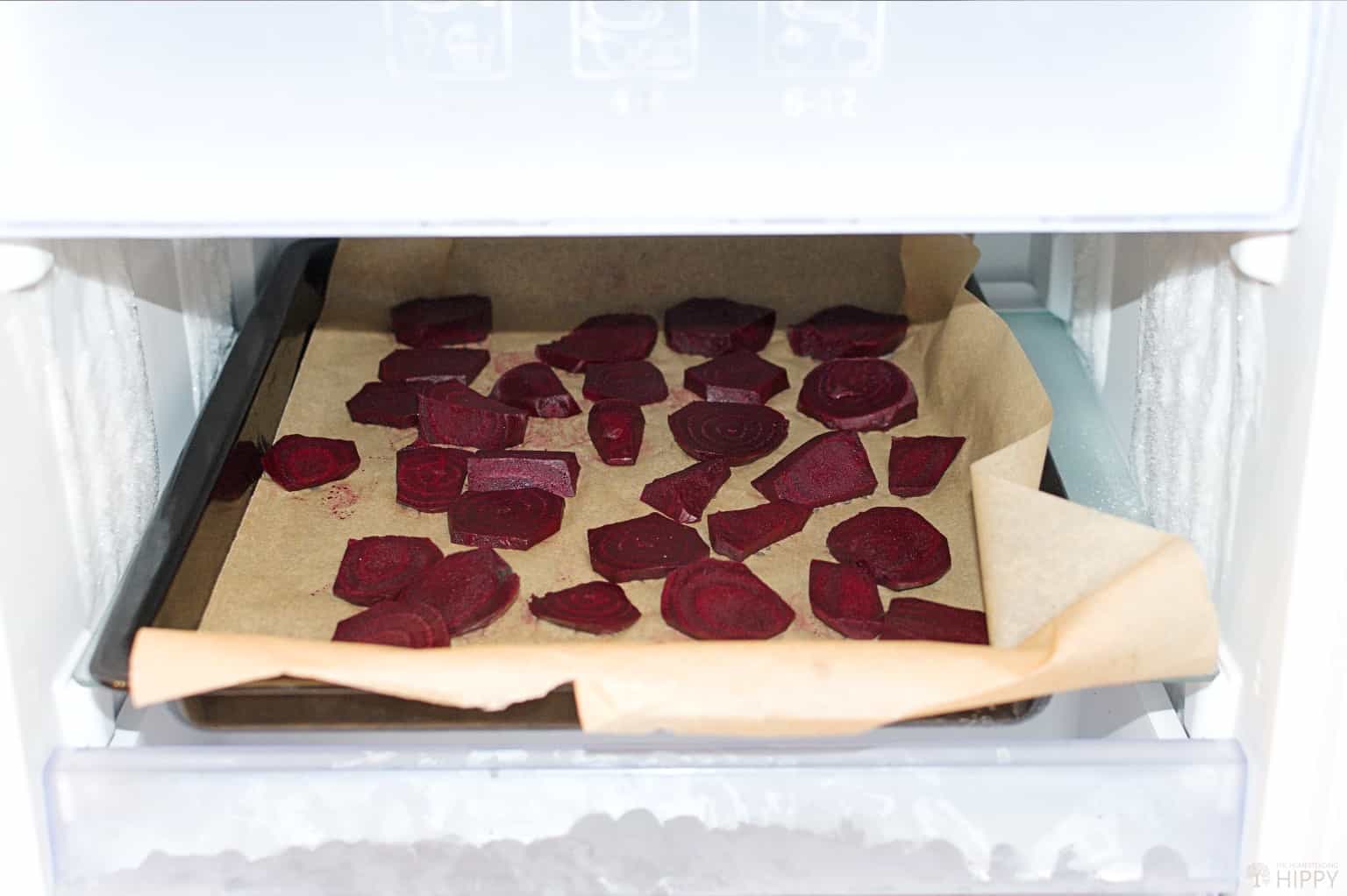Whether you’re growing your own veggies or buying them fresh from the store or the local farmers market, freezing what you don’t use is a great way to prevent waste or to make sure you have some on hand when they are out of season.

Luckily, pretty much all veggies can be frozen successfully. However, if you want to get the best possible results concerning shelf life, flavor, and freshness you’ll need to follow the right steps prior to freezing.
Let’s take a look at beets. Can you freeze beets?
Yes, beets can be frozen safely and will last a long time, but they should be cooked first and then chopped into small slices or cubes for best results.
Beets are one of the tastiest vegetables around, and if you are putting in the effort to grow your own beets or you just don’t want to go without when they are out of season you’ll be glad to know that you can freeze them easily and they’ll stay delicious for a long time until you thaw them.
But, like usual, you’ll need to prepare them properly to freeze them without hurting their texture or taste. I’ll tell you what you need to know below.
Nutritional Value of Beets
Beets are sweet and versatile, and a common fixture and all sorts of cuisine around the world. Even for people that hate veggies, chances are pretty good that they will like beets if they get to try them.
That’s especially good news for parents and anyone else who needs a nutritious diet because beets are quite healthy, especially when it comes to mineral content.
Looking at the minerals that beets contain we see they contain a large amount of manganese, totaling about 16% of the recommended daily value, along with a good amount of potassium, phosphorus magnesium, and iron.
Calcium and zinc are present in smaller amounts, and it’s also worth noting that beets contain a surprising amount of sodium, around 25 mg per ounce.
Now, looking at the vitamins we’ll see that they are less impressive overall as compared with the minerals, but still entirely worthwhile.
Most notably, beets contain a lot of folate, with a 3 and 1/2 oz serving containing a little over 25% of a person’s daily recommended value.
Besides folate, beets also contain a good amount of vitamin C, vitamin B6, vitamin B5, B3, B2, and B1.
Beets contain a lot of sugar, about 2.2 grams per ounce and this has made them a vital staple for the production of table sugar. Beets also have high water content, averaging 87% water by weight.
What You Should Know Before You Freeze
Beets can be frozen, and they do freeze well, but this is one veggie that you’ll need to put in some time preparing and cooking prior to freezing.
The National Center for Home Food Preservation recommends that fresh, whole beets be selected and sorted according to size prior to washing, and then trimming off the tops, leaving a half inch of the tap root and stems. This will prevent the color from running while you cook it.
Boil water, and then cook your beets in batches. Large beets will probably need to cook for about an hour, medium beets about 45 minutes, and your smaller beets anywhere from 25 to 30 minutes.
You want to cook them in batches so they don’t get over or undercooked because they’re all in a big, mixed-up jumble. Once cooking is completed, remove, strain, and cool them right away in cold water.
Then all you have to do is peel them, completely, remove the stem, and root, and then cut the beets into slices or cubes according to your preference. Whew!
The last thing to do is pack your slices or cubes in the container of your choice, making sure to leave at least a half inch of headspace to account for the expansion of moisture. Seal your container, stick them in the freezer and you’re done!
Can You Freeze Beets When Raw?
You can, but you shouldn’t. This will degrade the quality of your beets, badly affecting their taste and texture.
Can You Freeze Beets When Cooked?
Yes, and you should. Beets are one of those veggies that really should be cooked and cut into like-size portions prior to freezing if you want the best results.
Doing so will ensure that the beets last as long as possible and also taste great after you thaw them.
How Long Do Beets Take to Freeze?
It varies depending on the size of the slices or cubes. Smaller thinner slices and smaller cubes will freeze solid in a couple of hours, while larger slices or chunks will take between 3 and 4 hours.

How Long Will My Beets Keep When Frozen?
According to foodsafety.gov, beets that are prepared properly and promptly frozen will keep for between 6 and 8 months. Quite a long time, and pretty respectable for a vegetable!
Will Beets Get Freezer-Burned?
Yes, they can. Even when properly cooked and prepared beets can still get freezer burn and they are surprisingly vulnerable to it owing to their high water content.
This can be managed, though, and you can expect your beets to come out still tasting fresh and great after a long freeze. See the next section.
What’s the Best Way to Prevent Freezer Burn?
Keeping your beets from getting freezer burn is mostly a matter of proper preparation and container selection, keeping air away from them, and keeping your freezer truly cold.
Depending on your usage and a specific model of freezer, you’ll have more or less control over the factors involved.
First things first, do whatever you can to keep as much air as you can away from your beets.
This means you need to pick a container that will seal tightly and only leave enough room in the container to accommodate expansion but not excess air.
On the other hand, you must be cautious to avoid leaving too little room for expansion or you could have a busted container!
Then, keep your freezer as cold as possible; the closer to 0 °Fahrenheit (-17 °Celsius) you can get it the better. Colder temperatures always work in your favor for preventing freezer burn.
The last thing is to simply avoid letting warm air into your freezer which will allow for further condensation and ice formation.
Open your freezer as little as possible, and when you do open it, get what you need and shut it again as quickly as possible. Never, ever leave your freezer open!
Follow these simple steps and you can keep your beets from getting freezer burn the whole time they are in storage.
How Can You Tell When Beets Are No Longer Good?
You’ll know that your beets are no longer good if you notice they are badly discolored or, upon thawing them, they have completely lost their shape, gone very mushy, or have an unpleasant flavor.
Do note that your beets are in all likelihood still safe to eat, and even nutritious, so long as they were safe when they were frozen but they probably won’t taste very good if you use them in a dish.
Can You Refreeze Beets Safely?
Yes, strictly speaking you can refreeze your beets safely. However, this is going to do them no favors when it comes to taste and texture.
Beets, as mentioned above, contain a lot of water, and when that water freezes necessarily it will do some damage to the flesh of the veggie.
This will change the texture, naturally, but if you follow the beets and then refreeze them it is going to do even more damage to the flesh and turn them into a mushy, nasty mess the next time around.
Once again, they’re probably safe nonetheless, but you will probably not like the end result.
What is the Best Way to Defrost Beets?
You have three options for defrosting your beets, and only two of them are good. The first option, and the go-to for many people, is to defrost them in the microwave.
You can expect them to defrost unevenly and for some of them to start cooking unless you watch them and check them regularly.
The second is to simply place them in the refrigerator, or they will thaw over the course of a day or so.
If you are in a hurry, simply place your beets in a Ziploc bag and immerse them in a large bowl of cold water. This will rapidly thaw them in an hour or two.
The post So, Can You Freeze Beets? appeared first on The Homesteading Hippy.
